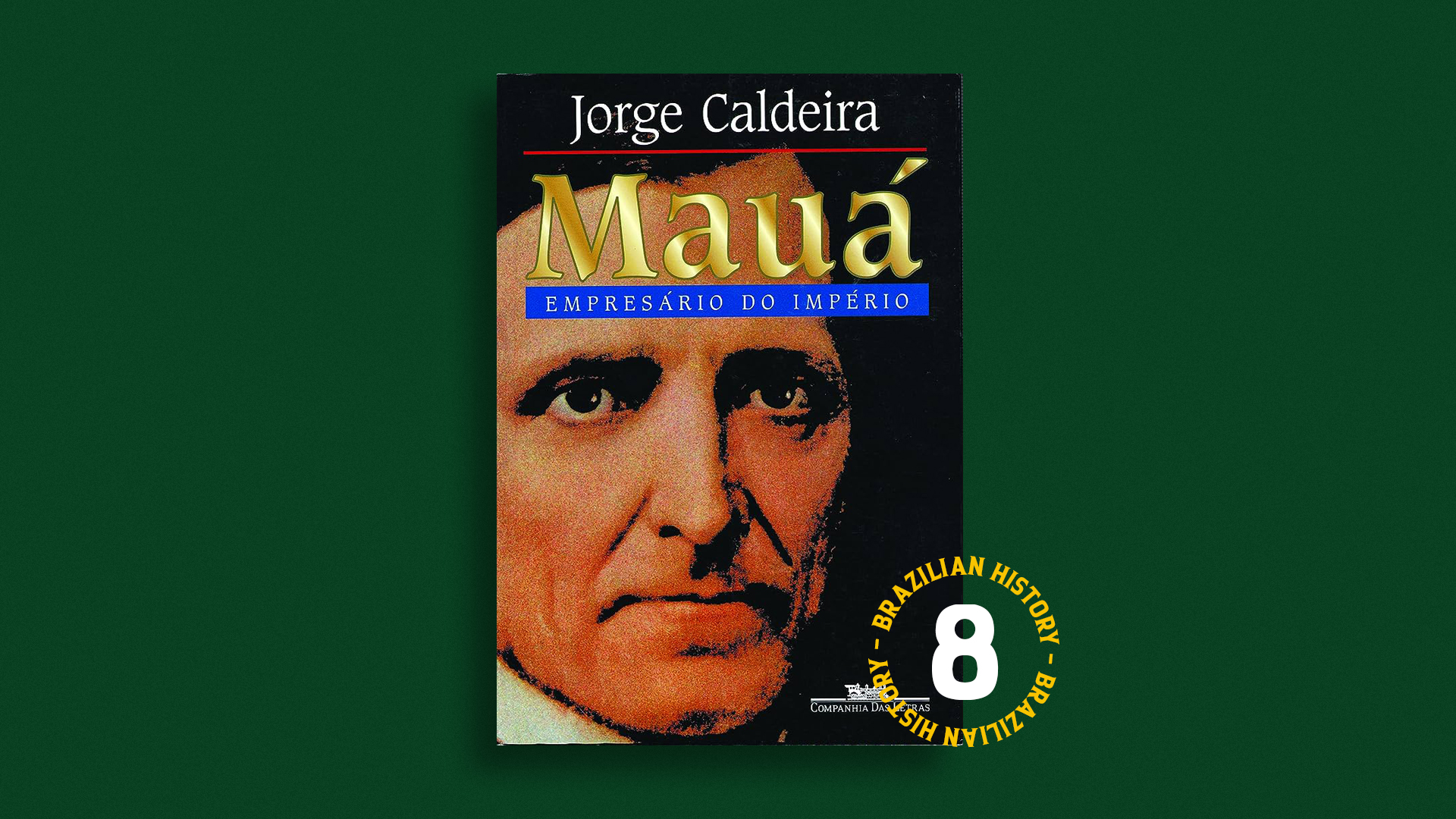The book Mauá: Businessman of the Empire is a biography written by Jorge Caldeira that narrates the life and journey of Irineu Evangelista de Sousa, better known as Viscount of Mauá. Published in 1995, the book offers a detailed insight into the life and achievements of this important Brazilian historical figure of the 19th century.

The book describes how Mauá, born in 1813, began his career as a modest merchant in Rio de Janeiro and, over his lifetime, became one of the most influential and visionary entrepreneurs of the Brazilian Empire. Mauá played a pivotal role in the economic development of Brazil during the imperial period, promoting industrialization, modernizing railways, and expanding the country’s economic activities.
Jorge Caldeira explores Mauá’s contributions to the development of Brazil’s economic infrastructure, highlighting his innovative initiatives in building railways and creating companies that played a crucial role in the expansion of the Brazilian economy. Additionally, the book also examines the complexities of Mauá’s personal and political life, including his relationships with the imperial government and his involvement in social and political issues of the time.
To start by providing more details about Jorge Caldeira’s book, I couldn’t help but mention the cover – a seemingly simple cover that conveys a sense of suspense to the reader with its predominant color being black and an image of Mauá contrasting against this color.
The book is rich in its numerous details, and it is evident that thorough research was conducted. We can find excellent images in the book that serve as illustrations for the story being told and enhance immersion. The table of contents is highly detailed, and the typography is in an excellent size.
At the beginning of the book, there is a focus on Mauá’s childhood amid a historical transition period in Brazil with his family. Mauá had a very simple and sad childhood; he lived isolated on a cattle ranch, and he tragically lost his father at a very young age.
Due to his stepfather’s refusal, Mauá went to Rio de Janeiro to work in commerce in his first job as a clerk at a warehouse. This part of the book depicts Mauá’s ascent in his career from a clerk in less prestigious positions to higher-ranking roles.
In the book, the author delves extensively into how society and its people lived during that time, and how Mauá was influenced by his readings, such as Adam Smith, Viscount of Cairu, and his favorite, David Ricardo. Through diligent study of business and discussions with his employers, Mauá mastered the secrets of the path he was pursuing.
An episode that tarnished Mauá’s image was when, being from Rio Grande do Sul and having family there, he received visits from revolutionaries at his home, which was reported by the press. Following this, he went to England after the coronation of Pedro II to appease the situation and be “forgotten.” Not only to “clear his name,” Mauá went to England to observe the industrial progress and economic advancement of the country, so that he could return to Brazil with new entrepreneurial knowledge.
In the reading, we can observe how Mauá was a man ahead of his time; he supported the women in his household and never treated them with disdain. His wife could travel and move about the city freely, and Mauá never mistreated her. His concern was for the future. The author provides an introduction to all of Mauá’s enterprises, including the Mauá Bank, which was the primary bank in Uruguay at the time, railways in Brazil, and other ventures in various countries. Mauá controlled 8 out of the 10 largest Brazilian companies at the time.
Jorge Caldeira manages to create a dramatic narration at certain moments that require no effort from the reader’s imagination to visualize the events, one example being Mauá’s arrival in Rio as a child. Furthermore, the author always concludes the chapters with an air of suspense, ensuring that the reader continues to read without losing the narrative, which is a good technique but sometimes can be a bit excessive.
Something frequently written in “Mauá: Businessman of the Empire” is both positive and negative critiques of the characters from the historical period in which the work is set. The author attempts to create intrigue between Mauá and Pedro II, which I find quite unjust. It’s hard to imagine that the emperor would be against someone who was bringing progress to the country. In fact, Pedro II bestowed upon Irineu the titles of Baron and Viscount of Mauá, and the emperor was supportive of new inventions from Brazil and the world. I believe this is the author’s biggest misconception.
The book tells a lot about the governments of each period of the Empire of Brazil, from those that contributed in a more beneficial way to the progress of the country to those that hindered more than helped. According to the book, it becomes quite clear that Mauá faced challenges from all sides, whether in Brazil with the government or due to errors from business partners and foreign countries with their ventures.
The book “Mauá: Businessman of the Empire” provides a comprehensive view of the life and achievements of Irineu Evangelista de Sousa, showing how he played a pivotal role in the economic modernization of Brazil during the 19th century and became an iconic figure in entrepreneurship and industrial development in the country. The book also sheds light on the historical and political context of the time, offering a deeper understanding of imperial Brazil.
Reference: CALDEIRA, Jorge. Mauá: Empresário do Império. Brazil: Companhia das Letras, 1995.

Matheus Araújo
Matheus is an entrepreneur at Araujo Media, where he serves as CEO and Creative Director. He shares analyses on his personal blog "matheusaraujo.me" and is currently pursuing a degree in Advertising and Propaganda. Moreover, he has a passion for history, particularly that of Brazil, which led him to become the founder and editor of the Brazilian History portal.
